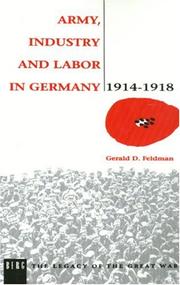
Army, Industry and Labour in Germany, 1914–1918
By Gerald D. Feldman
Subjects: Germany, economic policy, Hc286.2 .f4 1992, World war, 1914-1918--economic aspects--germany, 338.0943, World war, 1914-1918, germany, World War, 1914-1918, Manpower policy--germany--history--20th century, Economic aspects of World War, 1914-1918, Germany, Manpower, World war, 1914-1918--economic aspects, Manpower policy--history, Economic aspects, Manpower policy, Economics, History
Description: This innovative study by one of the leading specialists in the field examines the social and economic role of the German army in the nation’s internal affairs during the First World War. This was the area in which the influence of the army was most direct and profound. Germany’s wartime economic mobilisation was both planned and directed by the army, and as a consequence of this largely unanticipated responsibility, the army was compelled to cope with the great social conflicts of Imperial Germany. In the process of confronting the groups representing army and labour, the army paved the way for the establishment of collective bargaining in Germany and also created the foundations for the postwar inflation. (Source: [Bloomsbury Publishing](https://www.bloomsbury.com/us/army-industry-and-labour-in-germany-19141918-9781472577986/))
Comments
You must log in to leave comments.